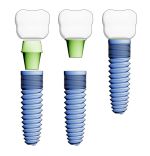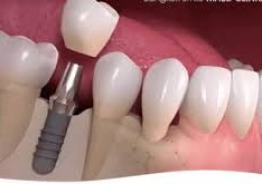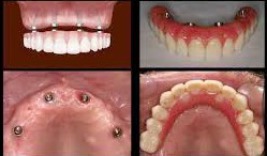Dental Implants : A necessity rather than a Luxury...
Dental Implants are miracles of modern design and engineering. They are the future in dentistry and are becoming more and more widely used by dentist across the globe. The success rates of Dental implants have become more than 95 % in the past few years and people are finding comfort and confidence in replacing their missing teeth with dental implants.
A dental implant is an artificial tooth root made of titanium which is placed into the jawbone. It is used to support one or more teeth.
From the replacement of one tooth to all the teeth, dental implants provide a predictable long term solution giving a fully functional, aesthetic
result.Dental implants are designed to provide a foundation for replacement teeth that look, feel, and function like natural teeth. The person who has lost teeth regains the ability to eat virtually
anything and can smile with confidence.
At Amesbury Dental we use the Straumann Implant system, which is Swiss made. They are the 2nd largest implant manufacturer in the world, and used worldwide.
Implant surgery is a highly specialised area of dentistry and can only be carried out by dental surgeons trained in this particular field. It is a very technical, labour intensive process hence the
relatively high costs involved. However, once the work is complete the results are amazing with patients having beautiful, realistic teeth which apart from regular dental check-ups, need no further
specialist care or procedures. It is a genuine , worthwhile long-term investment,and sometimes can be life- changing.
Dental implants have given countless patient benefits .
- Fixed – hence very comfortable and convenient.
- No need to cut healthy adjacent teeth.
- Well documented longivity.
- Implants can make loose Dentures very retentive.
- Dental implants help to preserve bone height.
- Improved comfort
- Improved speech
- Dental implants let you chew eat and function like having natural teeth.
- Provide a solid stable, long lasting solution that will serve you for a long time.
- It will help you smile with confidence again.
FAQ ::
Why do we need to replace missing teeth ?
Attractive, healthy teeth play an important role in our general health and well-being. You look and feel confident, free to laugh with friends and family- anytime and anywhere. There are many reasons why people lose their teeth, which can have a strong impact on your quality of life. Missing teeth can cause bone loss and the jawbone to shrink. This is because the bone is no longer stimulated when you chew food. This results in physical changes to your face: you jaw link shrinks, your face takes on a more sunken in appearance.
How will I know if implants can be done in my case?
The implant exam and consultation will evaluate your mouth with a clinical exam and an x-ray exam in order to determine your potential for implants. This exam will also be where you can discuss what type of implant replacement will work best for you. The x-ray exam will be able to show how much bone is present in the locations where you will need implants placed.
How long can implants last?
Different long term research studies have shown that implants which have been placed in good bone can last for a patient's lifetime. However, some implants can fail if the quality of the bone wasn't good, if there was too much bite stress for too few implants or implants which weren't long enough for the demands of a given case.
Why is there a 3-6 month waiting period before the implants can be built upon?
There is the need for the implants to attach to the bone by a process which was originally described as osseointegration. The length of time for this waiting period varies with the quality of bone that is present where the implants were placed.
Is dental implant surgery painful?
No. An effective local anesthetic is used during the surgery so that you do not have any discomfort during the placement of the implants. The mild discomfort you might experience after surgery can be controlled with medications.
When can I return to work after implant surgery?
You can go to work the next day, unless some particular surgical circumstance arises. Your implant dentist will discuss all postoperative instructions with you.
Is there any pain after the anesthetic has worn off?
Patients have feeling which ranges from discomfort to slight pain. The variation depends on the number of implants placed, their location as well as a patient's tolerance for pain.
If I wore a full or partial denture before the implant surgery, can I wear it afterwards?
Post-surgical swelling may interfere with wearing a full or partial denture immediately after the surgery or until after the swelling has gone done. Each case varies and therefore, this should be discussed with your implant surgeon.
Once I have implants placed and built upon, do I have to clean around them?
Yes! If you don't clean around the implants, they can get gum disease. Gum disease can lead to the failure of the implants if it is not treated before too much bone has been destroyed.
How do you know how many implants you need?
Each case varies regarding how many implants are needed for the demands of replacing the missing teeth. If the implant surgeon is limited regarding the length of implants that can be placed, more implants will be needed. The length if the implants is determined by how much bone you have present. A good consideration is to have enough implants built upon that if one implant fails, there are enough implants left which will prevent the failure of your whole implant reconstruction. "An implant failure should not mean a case failure".
How will I clean around the implants?
The cleaning demands vary depending on the type of implant reconstruction that you had. You definitely need to clean daily around the implants. Brushing with a toothbrush, as as well as flossing are important. There may be the need for a prescription mouthrinse (chlorhexidine) which can further help you keep your implants healthy. Electric toothbrushes can also be helpful for cleaning around implants. Other cleaning aids may be recommended where the specific needs of your case require them.
Do I need to have a professional cleaning by the dentist or hygienist?
Yes. It is important to not only have a professional cleaning done around the implants, but you also should have periodic implant check-ups with your implant surgeon regarding the health of the implants.
For more information you could also visit
www.salisburyimplantdentist.co.uk
http://www.straumann.co.uk/en/patients.html






